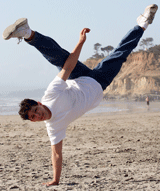Self-reliant learning (brief description) <<< Back Article by Sven Cederberg
Self-reliant learning is a state of learning in which the learner, consciously1 and/or subconsciously1, …
wants to and is able to perform learning tasks beyond the next test relies on a high level of metacognitive2 processes has a holistic3 understanding of learning Typical of the self-reliant learner is that he or she has, consciously and/or subconsciously, developed a learning/working platform4 with seven distinct features:
- Goal-orientation
- Awareness of resources
- Natural motivation
- Effective planning
- Brain-friendly methods
- Self-assessment
- Self-evaluation
1/ conscious/subconscious
In our terminology, learning processes can be either conscious or subconscious, whereas the terms unconscious and non-conscious indicate a total lack of such processes. Conscious learning involves immediate awareness of tasks and methods. Subconscious learning involves awareness at a level, which is not immediately discernible. An example: You work hard to solve a problem and go to bed without having found a solution. Next morning you wake up and a solution presents itself readily. Your brain has been working subconsciously during the night.Your ability to work subconsciously depends on your level of metacognition. A high level of metacognition allows for efficient subconscious work, which in turn boosts your learning results.
2/ metacognitive
Metacognitive processes monitor your learning (cognitive processes). They act as mental supervisors, teachers, guides. Metacognitive processes develop naturally in all human beings, and they generally act at a subconscious level. What is important for the aspiring self-reliant learner is the fact that it is possible to raise your metacognitive level by conscious efforts. Here is how it works:Mental (cognitive) processes are, basically, information processing, which you might quite simply refer to as thinking. Metacognition could then be considered as your subconscious thinking about your learning (thinking). By analyzing and improving your thinking about your thinking about your learning, you naturally raise your metacognitive level.
3/ holistic
Holistic means ‘whole’. In our terminology, holistic learning is based on three principles:The learner …
“sees the forest despite all the trees” uses brain-friendly strategies that grasp natural wholeness and overall principles embraces all the seven keys (See 4/) In traditional education, students are taught endless details about every tree, but they never learn that all those trees make up a forest, they get their heads stuffed with detailed information they cannot use, and they keep stitching on a patchwork they cannot even see the contours of.
4/ learning/working platform
Self-reliant learners, with a high level of metacognition, quite naturally use the following “seven keys” as their learning/working platform. They do not use them as isolated fixes; they use them as a complete unity.Goal-orientation
To be goal-oriented means that you …
analyze and interpret curriculum and other formal goals set realistic personal goals adapt, phrase, and internalize such goals to suit your needs always keep your goals in mind and continually follow up on them Awareness of resources
The self-reliant learner realizes that he, himself, is the No 1 resource, but he also knows how to utilize other, including human, resources. So the self-reliant learner is, by no means, a loner. Rather the opposite. He is an expert communicator and an expert at finding and assessing different kinds of information from many sources.
Natural motivation
Although the self-reliant learner is naturally motivated, he may have to work on his motivation. This is often the case when curriculum goals clash with personal goals, or when curriculum or other formal goals seem unrealistic or unclear.
Effective planning
Realizing that planning saves time is evident to the self-reliant learner, so he makes sure he uses the best possible planning tools.
Brain-friendly methods
Having a good understanding of how his brain works, the self-reliant learner gets “many miles to the gallon”.
Self-assessment
Anyone who is goal-oriented is bound to think: “Am I reaching my goals? How can I find out?” The self-reliant learner knows how and he checks his progress continually.
Self-evaluation
Anyone who checks his learning progress continually is bound to ask himself: “Why am I (not) getting the results I have been hoping for?”
The self-reliant learner knows how to evaluate (and how to change) his learning and working routines.
